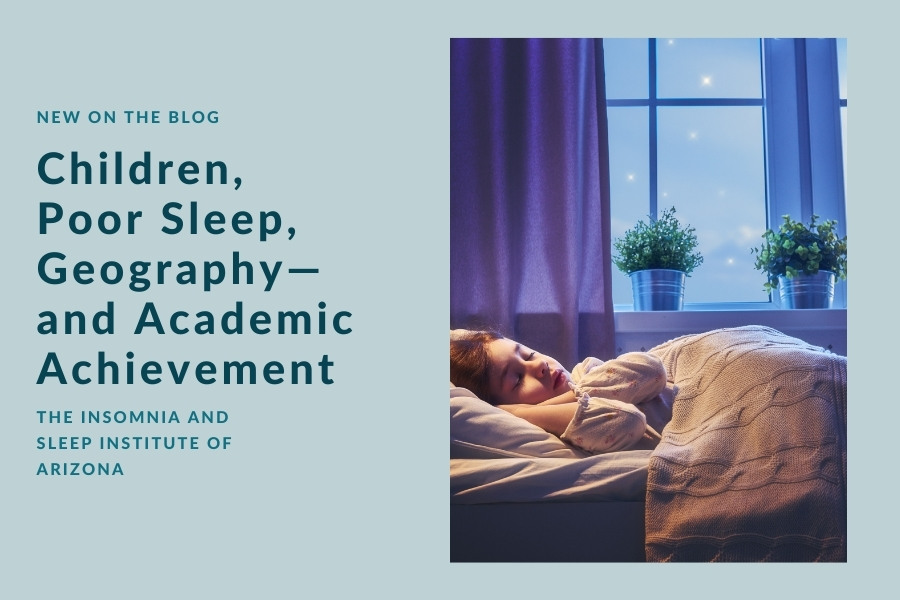There is a trend seen with children getting poor sleep who live in “disinvested neighborhoods” and a lower academic achievement. The Insomnia and Sleep Institute of Arizona treats pediatric patients as young as two years old because we understand the importance of quality sleep at all ages. We set the standard in sleep medicine in Arizona, offering unprecedented staffing levels where patients have access to three sleep specialists (starting at the initial consultation), nurse practitioners trained in sleep medicine, a clinical psychologist focused on cognitive behavioral therapy for insomnia, and respiratory therapists. We are driven by outcomes, prioritizing a correct diagnosis so that proper testing and treatment may follow.
According to research published in Child Development and authored by a collaboration of researchers from Harvard Medical School, NYU Grossman School of Medicine, and the University of Texas, Austin, teachers say that they notice more sleepiness in children who exhibit lower adaptive behaviors (such as being engaged in the classroom). They also report more behavior issues in such students when they are in first grade. Such sleepiness is also a predictor of poorer academic achievement even one year later when students are in second grade. Another factor is parent-reported resistance to bedtime and/or breathing that is disordered, which also has links to lower academic achievement.
The Systemic Issue of Childhood Sleepiness
Researchers noted that “poor sleep health” is especially prevalent in children of color and/or from lower socioeconomic backgrounds. However, although it is well-known that children of color and those from disinvested neighborhoods don’t do as well in school, the researchers noted that there are few sleep studies that make use of standard measures of behavioral and academic success in school. The authors undertook a longitudinal study to look at how sleep, academic achievement, and classroom behavior inform one another among Black children in such neighborhoods. For purposes of this research, the term “disinvested” is used for neighborhoods that do not have adequate city services, public funding, and/or private funding. These areas are also routinely segregated in regard to racial and economic lines.
According to the researchers, their findings “highlight the importance of educating both parents and teachers about fostering positive sleep habits in young children for their school success.” The researchers encourage teachers to tell parents what they observe in the classroom in regards to sleepiness, but to do so in a mutual and “culturally-affirming” way.
Pediatric Sleepiness Study Findings
In total, participants included 572 mostly Black girls and boys in the first grade. Just over 50 percent were from families of immigrants. Ten schools in “historically disinvested” New York City neighborhoods were included. The children were analyzed for three factors including sleep health and sleep disorder symptoms, classroom behavior, and academic achievement. The parents answered a questionnaire on sleep duration, daytime sleepiness, bedtime resistance, sleep onset delay, and disordered breathing. Teachers completed a questionnaire on daytime sleepiness.
A coding system was used to determine adaptive classroom behaviors. These included nodding, working on assignments, listening, and sitting up. Problems (emotional and behavioral) were also observed. Finally, there was a standardized academic assessment to consider math, writing, and reading ability in second grade. Since sleep is essential for everyone, the researchers stress a lack of sleep can lead to “increased problems in behavior, decreased engagement in learning activities, and lower academic achievement.” Findings have led the researchers to recommend a sleep health curriculum for both parents and teachers to foster sleep health.
Sleep and Your Children
Although the study of course had limitations, such as the fact that parents and teachers were reporting and most students were Black, it is a good start in considering sleep health for a young child’s overarching academic career. The researchers acknowledge the inherent bias of their participant pool and encourage future studies that branch out beyond this limited study. No matter where you and your child live, it is important to bear in mind that quality and quantity of sleep makes a big difference in academic success and behavior. Help is available for all pediatric sleep disorders.
If you are concerned about your child’s sleep health, connect with The Insomnia and Sleep Institute today. You can call the office directly or for a faster response simply complete the online form.





